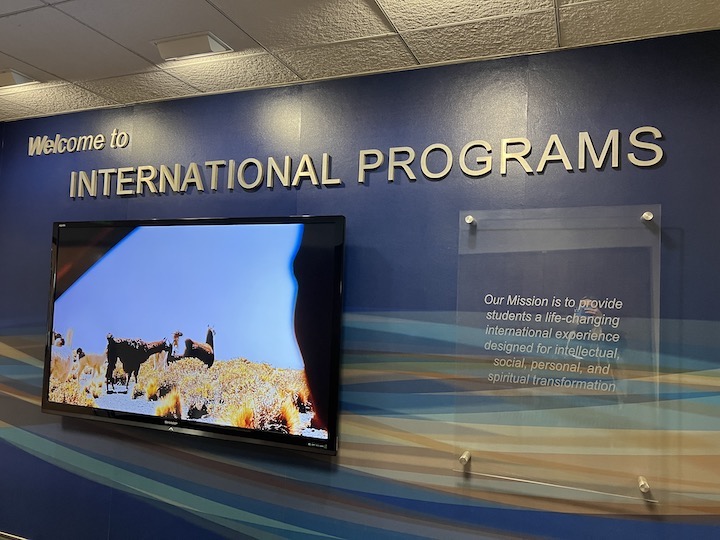
At Pepperdine, peer pressure is present.
When it comes to international programs, students feel pressured to spend a summer, semester or year overseas during their time as a Wave.
Jojo Inouye, sophomore business administration major, is ultimately glad he spent his Fall 2022 semester in Lausanne, Switzerland, but is not sure he would have made the decision to go abroad on his own.
“If I didn’t have friends who were going abroad, I don’t even know if I would have gone abroad,” Inouye said. “There is that pressure of taking advantage of the resources you have.”
The deadline to apply to study abroad is due at the end of September, shortly after many first-years arrive at college. Many said they stressed over how quickly they had to decide on these international programs that Pepperdine pitches as a life-changing experience.
Not every student who gave in to the pressure had a positive abroad experience, while at least one student said they resented the pressure entirely. Others said they don’t have a strong desire to study abroad or face obstacles that stand in the way.

A fast application process
Some students come to Pepperdine knowing they want to go overseas. But the fast-paced application process to go abroad during their sophomore year can still be a challenge.
Charles Choi, communication professor and 2023-2024 faculty in residence for the Florence program, said this process can be overwhelming when adjusting to college life.
“You’re still kind of getting your bearings as far as college life is concerned and the newfound independence is something that is still developing,” Choi said.
Inouye said if he had more time to apply, he would have approached his application differently.
“One thing I would definitely do if I had more time would be to look into each of the programs, maybe even look into summer programs too to see what I was interested in,” Inouye said. “Something differently I would do too would be to actually choose a program for myself instead of my friends.”
Ryan Linney, first-year political science major, is studying abroad in Heidelberg, Germany, for the 2023-2024 academic year.
Linney is confident he chose the right international program, but still felt the pressure of a fast application process.
“I think I chose the right place when I was choosing where to go,” Linney said. “In terms of getting the actual application done, it was way too fast of a turnaround.”
Linney said he did not have enough time to think about whether or not he wanted to go abroad.
“In a way, I didn’t really have time to weigh my decision,” Linney said.
Charles Hall, sociology professor, 2023-2024 faculty in residence for the London program and previous dean of International Programs, said the reason for this fast application process is because students need to take language prerequisites and plan to take necessary classes during the spring semester to go abroad and still graduate on time.
Hall also said this fast application process can be a downside for a first-year who just got to college.
“Every year we assessed whether or not we should continue doing that because of the disadvantage of ‘You just got here, you’re just getting situated,’” Hall said.
A Pepp Post poll of 53 students found that 42% of students came to Pepperdine for International Programs. Roughly 51% of students applied for fun and 22% felt Pepperdine pressured them to apply.
Studying abroad isn’t always as glamorous as it seems
Studying abroad can lead to networking and soft skills such as cultural awareness, team dynamics and self-motivation, Alison Harrell wrote in a 2017 North American Colleges and Teachers of Agriculture article.
But studying abroad can also lead to challenges, such as separation from family and friends, isolation and adapting to a new culture, Harrell wrote.
Inouye said studying abroad in Lausanne provided a unique perspective and a strong sense of community.
“I got to see the world from different perspectives in a way that I never would have been able to,” Inouye said. “We were like one big family together.”
Inouye also said he experienced challenges.
“I kinda felt a little disconnected from my parents as well, just from my family,” Inouye said.
Being abroad did not always bring comfort, either.
“You have to be comfortable being uncomfortable,” Inouye said.
Jamisen Casey, sophomore international studies and political science major, was supposed to study abroad in Lausanne, Switzerland, and Washington, D.C. for the 2022-2023 academic year.
However, Casey’s abroad experience was far from positive.
“It didn’t really have any positive effects,” Casey said.
Casey grew up in Germany and lived overseas from a young age. Casey realized she had already gotten the abroad experience and decided to drop out of the Lausanne program halfway through her fall semester and go home. She reflected on why she initially chose to apply.
“Pepperdine just pushed it so much and all of my friends were applying,” Casey said. “I felt like it was the normal thing to do.”
Casey also struggled to find a community in Lausanne.
“I really struggled to make friends in the program because it’s so small and there are not that many kids,” Casey said. “I ended up being alone a lot.”
Resenting the ‘norm’ of studying abroad
Studying abroad is increasingly becoming a social expectation and “normative behavior,” Knut Petzold and Tamara Peter wrote in a 2015 Research and Higher Education article.
At a school like Pepperdine, it is a difficult topic to fully avoid.
Hall said International Programs have become an unavoidable aspect of Pepperdine culture.
“The culture here almost forces you to at least think about studying abroad,” Hall said. “Once you arrive as a freshman, you’re confronted with: ‘Are you going overseas?’”
Lily Preis, sophomore public relations major, did not apply for an international program. She said she still experienced pressure to go abroad.
“It kind of felt forced on us,” Preis said.
Unlike some of Preis’ friends, she does not think going overseas is necessary.
“Everybody else was like: ‘It’s been my dream since I was 10, it’s gonna help me in my major, it’s gonna help me in my language and my profession,’ and it just wasn’t something that I saw as necessary as an 18-year-old freshman,” Preis said.
Preis said studying abroad is a social norm she feels she missed out on. But she doesn’t regret her decision to remain in Malibu. Staying on the Malibu campus provided Preis with the benefits of academic flexibility and an internship. She said going abroad isn’t essential in order to have a good college experience.
“I think normalizing that you don’t have to and that being on campus is still a great option, a normal option, and it’s still Malibu,” Preis said.
The poll found that the top three reasons students did not apply to study abroad was the time commitment of being away, feeling too overwhelmed with settling into college or not having enough space in their academic plan.
The challenge of getting in
The number of students who study abroad from the United States has tripled over the last two decades, Harrell wrote.
As the number of students who study abroad has increased, so has the competition for getting in.
The poll found that 75% of students were accepted into their first-choice program.
But some have faced waitlists or flat-out rejection.
Austin Yerke, sophomore business administration major, applied to study abroad three times at Pepperdine. After being waitlisted for the Florence program his first year, Yerke decided to reapply the following semester and was rejected. Yerke applied to study abroad a third time during his sophomore year and was accepted into the Hauteville, Switzerland, program for Fall 2023.
Studying abroad is something Yerke wanted to experience as a sophomore.
“This is the one thing I wanted to do,” Yerke said. “Everybody made it seem like it was the thing at Pepperdine and so I felt like, you know, I couldn’t take part in that experience as a sophomore because that is when a lot of people go.”
While Yerke is very excited about the opportunity to go abroad as a junior, he thinks he will face disadvantages for being accepted into a program later than most other students.
“I’m happy that I’m going, but it’s going to be with people that I don’t know because I’m going to be a junior.”
The International Programs Office encourages students who are waitlisted and/or rejected to keep trying.
“We encourage students to stick with the process because every year we have over 100 students that withdraw from programs,” said Greg Muger, director of the Malibu International Programs office. “Many students come off of the waitlist.”
Of seven students who said they were waitlisted on the poll, five got off the waitlist and into a program.
Muger said the COVID-19 pandemic affected the study abroad numbers for the last three years. Suspended programs, larger than normal first-year classes and the termination of the Shanghai campus increased competition.
But studying abroad at Pepperdine has always been competitive. Waitlists and rejection will always be a part of the process.
“Waitlists are necessary,” Muger said. “We have the same demand for programs that we did pre-COVID right now … we see it as being still competitive.”
Claire Everbach completed the reporting for this story under the supervision of Dr. Christina Littlefield and Dr. Theresa de los Santos in Jour 241 in Spring 2023. Dr. Christina Littlefield supervised the web story.



